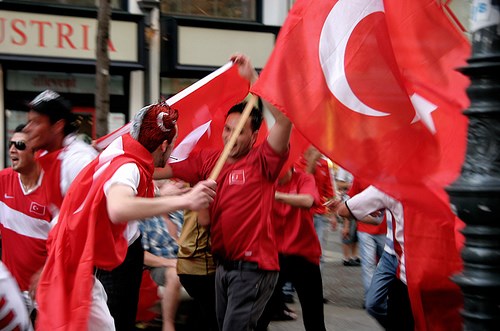Need for change in Turkish football governance

Turkish football fans. Photo by Flickr user astique. Used under Creative Commons 2.0 licence
09.06.2010
By Steve MenaryThat is the stark warning from the authors of a new report on governance in the Turkish game, which earlier this year saw Digitürk agree to pay €235 million per season for the TV rights to the Turkcell Süper Lig. We don’t see much professionalism and we need to change this,” warned Mete İkiz, director of private equity group NBGI and a member of the Corporate Governance Association of Turkey (TKYD), which has just produced the Governance Guide for Turkish Football Clubs – in the Light of Corporate Governance Principles. “If used wrongly, this [TV money] could be the end for Turkish football.”
Starting bids for the new four-year TV rights deal from Digitürk, which is part of the Çukurova Group, and Türk Telekom were €161 million and €156 million respectively before Digitürk retained the contract with a knock-out bid.
Excluding the Turkish Football Federation (TFF) share of the new money, 35 per cent will be distributed equally among the 18 clubs in the Süper Lig with the champions taking an extra 9 per cent and the top six sharing another 11 per cent.
The new bumper deal comes just as Bursapor became the first side from outside of the three Istanbul clubs – Beşiktaş, Galatasaray and Fenerbahce – in 26 years to win the Süper Lig title.
The combination of the bumper TV rights deal and Bursa’s surprise title success mean that now is the time for a change in governance argue the authors of the new guidelines.
“Last season Galatasaray paid €125 million on transfers and Bursa spent €10 million but Galatasaray only came third,” added Mr İkiz at the launch of the English-language version of the report at Birkbeck Sport Business Centre in London last night (June 7). “The big clubs do not see the significance of this.”
“Galatasaray started the process of transparency after winning the UEFA Cup (in 1999/00) but then it changed again. Now smaller teams realise they can be champions like Bursa and the fans in the smaller cities realise they should be supporting their own city, not the big three from Istanbul. If they keep doing this, then the dominance of the big three will fall and that will be good for Turkish football".
The three Istanbul clubs and Trabzonspor are quoted on the Istanbul stock exchange, which provides some transparency, but there is no requirement from the TFF to make clubs publish annual accounts.
The report is not an official report and Dorukhan Acar, a project leader at Boston Consulting and TKYD member, said acceptance of the guidelines could take “five, six or even seven years” but the nine-man working group that produced the guidelines included the TFF’s marketing director Burak Gürkan and Doctor Levent Bıçakcı, a former TFF president and current member of UEFA’s legal advisory board, who was present in London for the launch.
Mr İkiz added: “There is a working group within the TFF to change the financial requirements for Turkish clubs, such as financial reporting and now is the right time [to introduce corporate governance] because of the money coming into the game from TV rights.
“The clubs are up for this because of the pressure from society, who sees the Turkish clubs are not successful. Secondly, the company that won the TV tender [Digitürk] wants to make the rights more valuable. Everything comes to the same point where things are about to change in Turkey finally.”
The larger Turkish language report includes the first attempt to gauge the size of the football industry in the country. In the 2008/09 season, the game in Turkey was valued at €525 million with TV rights providing the largest slice at €123 million. Prize money brought in €85 million, while general sponsorship totalled €75 million ahead of stadia advertising (€65 million), tickets (€60 million), Süper Lig sponsorship (€14 million) and lower league sponsorship (€10 million) with €92 million of ‘other’ income.
The total value for the 2008/09 season is up from €485 million in 2007/08 and €336 million from 2004/05, the first season included in the study. In the 2009/10 season, the TKYD report estimates that the size of the Turkish football industry will rise to €735 million – and that is before the new mammoth TV deal with Digitürk has even started.
The only other European nation with corporate sustainability guidance for clubs is England and the TKYD used this advice for guidance in writing their own report, which took six months.
David Newton, acting head of regulation at the English Football Association, also spoke at the launch, where the audience included former Chelsea and Manchester United chief executive, Peter Kenyon.
Mr Newton conceded that in the wake of Portsmouth this season becoming the first Premier League side to fall into administration there was “still work to be done” in the English game and a need for “increased transparency and credibility.”





